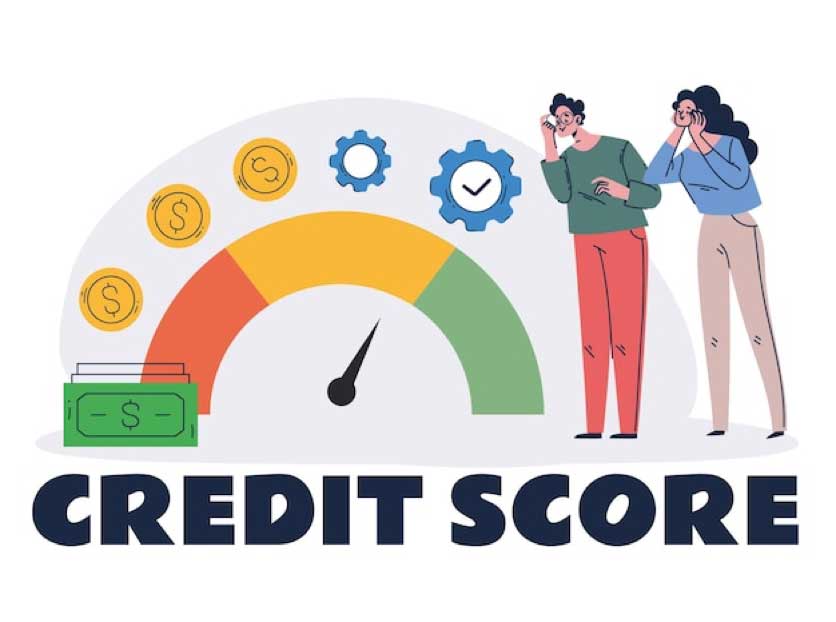The interest rate you get on a mortgage is often influenced by your credit score. A higher credit score generally means you qualify for a lower interest rate, making your mortgage more affordable. On the flip side, a lower credit score may lead to a higher interest rate, meaning you could end up paying more for your mortgage. The impact of your credit score on the interest rate is noteworthy because even a slight difference in your score can result in substantial savings on interest payments throughout the life of your mortgage. Therefore, maintaining a good credit score can play a crucial role in securing a more favorable and cost-effective mortgage deal.
When it comes to applying for a mortgage, your credit score plays a crucial role in determining the interest rate you will receive. Many Canadians are unaware of this, and they may be in for an unpleasant surprise when their application is denied or approved at a higher-than-expected rate. In this article, we will explore how credit scores impact mortgage rates, what credit score lenders are looking for, and what you can do to improve your credit score to secure a better mortgage rate.
Contents
- How Credit Score Impacts Mortgage Rates
- Understanding Credit Scores in Canada
- The Impact of Credit Scores on Mortgage Rates
- The Cost Savings of Having a Good Credit Score
- Factors That Affect Your Credit Score
- Building and Improving Your Credit Score
- Pay Your Bills on Time
- Manage Your Credit Utilization Ratio
- Use Credit Building Tools
- FAQs
- Does bad credit affect mortgage rates?
- Does the mortgage depend on the credit score?
- What is the minimum credit score for a mortgage in Canada?
- What credit score is best for mortgage rates?
- Conclusion
Understanding Credit Scores in Canada
Your credit score is a number between 300-900 that indicates how responsible you are with credit and the likelihood that you’ll repay your debts. In Canada, a credit score between 760-900 is considered excellent, while a score between 660-760 is considered good to very good. Scores below 660 are considered poor to fair, indicating that you may have mismanaged your credit in the past.
The Impact of Credit Scores on Mortgage Rates
Lenders use credit scores as a way to assess the risk of lending money to borrowers. A higher credit score typically translates to a lower interest rate, while a lower credit score may result in a higher interest rate. Even a small difference in your credit score can lead to significant savings on interest payments over the term of your mortgage.
To get the best mortgage rates, you’ll generally need a credit score of 760 or higher. This, coupled with consistent income and meeting the lender’s specific criteria, will increase your chances of securing a favorable interest rate. However, if your credit score falls between 660 and 760, you can still access various mortgage rates, although you may notice a slight increase in the interest rate. It’s important to note that a significant down payment can help mitigate this increase.
On the other hand, if your credit score is below 680, your access to lower interest rates may be limited, as rates tend to increase as your credit score declines. However, there are alternative mortgage options available, such as private lenders, although their interest rates and fees are often higher compared to prime lenders.
The Cost Savings of Having a Good Credit Score
Having a good credit score can result in significant cost savings over the duration of your mortgage. By qualifying for a better mortgage rate, you can save thousands of dollars on interest payments. Even small differences in interest rates can add up over time, as shown in the example below:
|
Home Price |
Mortgage Rate |
First Year Interest Paid |
|
$500,000 |
5.50% |
$26,628 |
|
$500,000 |
5.75% |
$27,833 |
As you can see, a difference of just 0.25% in the mortgage rate can result in an additional $1,205 in interest payments during the first year alone. Over the course of a 25-year mortgage, these savings can be substantial.
Factors That Affect Your Credit Score
To understand how your credit score impacts your mortgage rate, it’s essential to know the factors that influence your credit score. The two main credit bureaus in Canada, Equifax and TransUnion, calculate your credit score based on several key factors:
- Payment History:
Your payment history accounts for 35% of your credit score. Making your bill payments on time consistently is the most crucial factor in building and maintaining a good credit score. - Credit Utilization:
This factor accounts for approximately 30% of your credit score. It measures the percentage of your available credit that you are currently using. It is recommended to keep your credit utilization below 30%. - Debt:
The amount of debt you currently have is another factor that affects your credit score. High levels of debt relative to your income can lower your credit score. - Length of Credit History:
The length of time you have had credit also plays a role in determining your credit score. A longer credit history can demonstrate your ability to manage credit responsibly. - Bankruptcy History:
If you have filed for bankruptcy in the past, it will have a significant negative impact on your credit score. - Credit Applications:
Applying for multiple lines of credit within a short period can negatively affect your credit score.
Building and Improving Your Credit Score
If your credit score is not where you want it to be, there are steps you can take to improve it and increase your chances of securing a better mortgage rate. Here are three tips to help you build and improve your credit score:
1. Pay Your Bills on Time
Paying your bills on time is one of the most effective ways to build and maintain a good credit score. Your payment history carries the most significant weight in determining your credit score, accounting for 35% of the overall score. Late payments can lower your credit score and result in penalties, higher interest rates, and lower credit limits. Make it a priority to pay your bills on time, or at least make the minimum payment required.
2. Manage Your Credit Utilization Ratio
Your credit utilization ratio measures the amount of credit you are using compared to your total available credit. It accounts for approximately 30% of your credit score. To maintain a good credit score, it is recommended to keep your credit utilization below 30%. This means that if you have a total credit limit of $20,000 across all your credit cards, you should aim to utilize no more than $6,000 of that credit each month.
3. Use Credit Building Tools
Several credit building tools can help you improve your credit score. These tools allow you to establish a positive credit history by reporting small amounts of money each month to credit bureaus. By responsibly using these tools and making timely payments, you can gradually improve your credit score over time.
FAQs
Does bad credit affect mortgage rates?
Yes, bad credit can significantly impact your mortgage rates. Lenders consider borrowers with lower credit scores to be higher risk, leading to higher interest rates or even a denial of the mortgage application.
Does the mortgage depend on the credit score?
Yes, the mortgage you qualify for and the interest rate you receive are directly influenced by your credit score. A higher credit score generally results in a lower interest rate and more favorable mortgage terms.
What is the minimum credit score for a mortgage in Canada?
The minimum credit score required to qualify for a mortgage in Canada varies depending on the lender. However, a credit score of 600 or higher is generally considered the minimum threshold for mortgage eligibility.
What credit score is best for mortgage rates?
To secure the best mortgage rates, a credit score of 760 or higher is typically required. This demonstrates a high level of creditworthiness and responsibility, making you an attractive borrower to lenders.
Conclusion
Your credit score plays a significant role in determining the mortgage rate you will receive. A higher credit score can lead to lower interest rates and substantial cost savings over the term of your mortgage. By understanding the factors that influence your credit score and taking steps to improve it, you can increase your chances of securing a better mortgage rate. Remember to pay your bills on time, manage your credit utilization ratio, and utilize credit building tools to build and maintain a good credit score. With a solid credit score, you can achieve your goal of homeownership faster and with fewer financial challenges along the way.
Ready to take the first step towards homeownership? Contact Citadel Mortgages today to explore your mortgage options and secure a competitive mortgage rate. Our team of experts is ready to assist you in achieving your homeownership dreams.

Unexpected costs when buying a home in Canada
When buying a home in Canada, there are several unexpected costs that buyers should be aware of to avoid financial surprises. Some of the key

Considering An Early Mortgage Renewal
Why consider renewing your mortgage ahead of time? Well, one big reason is changes in interest rates. If rates drop, jumping on an early renewal

How to get a HELOC on an Investment Property in Canada
To get a Home Equity Line of Credit (HELOC) on an investment property, you need to follow these steps: 1. Know Your Finances: Estimate the

Expert Advice: Buying a House in Cash in Canada
In exploring the possibility of buying a house in cash in Canada, it’s essential to understand the various aspects that come into play. Here’s a

Average Down Payment for a House in Canada
According to the Canadian Real Estate Association, the average house price in Canada hit around $637,673 in August 2022. This means if you’re looking to

Assumable Mortgages: An In-Depth Look
Assumable mortgages are a unique financing alternative that could potentially save you thousands of dollars and simplify the home-buying process. But what exactly are they





